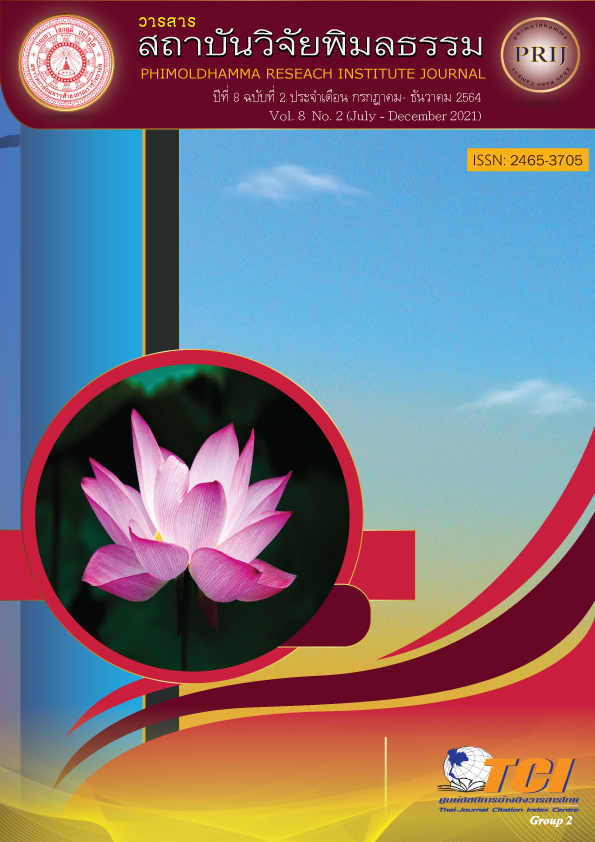การดำเนินชีวิตตามปรัชญาเศรษฐกิจพอเพียงของเกษตรกรอำเภอเสลภูมิ จังหวัดร้อยเอ็ด
คำสำคัญ:
การดำเนินชีวิต, ปรัชญาเศรษฐกิจพอเพียง, เกษตรกรบทคัดย่อ
การวิจัยครั้งนี้ มีวัตถุประสงค์เพื่อ 1) ศึกษาปรัชญาเศรษฐกิจพอเพียง 2) ศึกษาการดำเนินชีวิตของเกษตรกรอำเภอเสลภูมิ จังหวัดร้อยเอ็ด 3) ศึกษาการดำเนินชีวิตตามปรัชญาเศรษฐกิจพอเพียงของเกษตรกร อำเภอเสลภูมิ จังหวัดร้อยเอ็ด เป็นการวิจัยเชิงคุณภาพ เครื่องมือที่ใช้ในการวิจัย ได้แก่ แบบสัมภาษณ์เชิงลึก ผู้ให้ข้อมูลสำคัญ ได้แก่ พระภิกษุสงฆ์ 10 รูป ปราชญ์ชาวบ้าน 10 คน เกษตรกร 10 คน วิเคราะห์ข้อมูลด้วยวิธีพรรณนา
ผลการวิจัยพบว่า
1. ปรัชญาของเศรษฐกิจพอเพียง ได้แก่ แนวคิด ทฤษฎี หลักการปฏิบัติ ที่พระบาทสมเด็จพระเจ้าอยู่หัวรัชกาลที่ 9 ได้ทรงวางรากฐานไว้ให้คนไทยได้ยึดเป็นแนวในการดำรงชีวิตเพื่อให้เกิดความอยู่ดีกินดี ซึ่งมีองค์ประกอบ 7 ประการ คือ พึ่งพาตนเอง พอประมาณ เดินสายกลาง มีภูมิคุ้มกัน มีเหตุผล เป็นคนดี และรู้รักสามัคคี
2. การดำเนินของเกษตรกรอำเภอเสลภูมิ จังหวัดร้อยเอ็ด พบว่า 1) มีการช่วยเหลือตนเอง มีการประกอบอาชีพสุจริต 2) ด้านเศรษฐกิจมีความเป็นอยู่แบบพอเพียง มีการบริหารค่าใช้จ่ายในครอบครัว 3) ด้านสังคมมีการช่วยเหลือเกื้อกูลกัน มีความสามัคคีสร้างความเข้มแข็งของครอบครัวและชุมชนได้อย่างสมดุล
3. การดำเนินชีวิตตามปรัชญาเศรษฐกิจพอเพียงของเกษตรกร อำเภอเสลภูมิ จังหวัดร้อยเอ็ด พบว่า มีการนำหลักปรัชญาเศรษฐกิจพอเพียงมาใช้ ดังนี้ 1) ความพอประมาณ เป็นการสร้างงานให้มีความพอดีเหมาะสมกับฐานะของตนโดยไม่เบียดเบียนตนเองและผู้อื่น 2) ความมีเหตุผลในการตัดสินใจดำเนินการเรื่องต่างๆ ตามหลักวิชาการ หลักศีลธรรมจริยธรรมอย่างรอบคอบ 3) ระบบภูมิคุ้มกันในตัวที่ดี มีการเตรียมตัวและปรับตัวอยู่เสมอต่อการเปลี่ยนแปลงในด้านเศรษฐกิจ สังคม สิ่งแวดล้อม และวัฒนธรรม นอกจากนี้ยังต้องปฏิบัติตามเงื่อนไข 2 ประการ คือ 1) เงื่อนไขคุณธรรมด้วยการรู้ผิดชอบชั่วดี ซื่อสัตย์สุจริต ใช้สติปัญญาอย่างถูกต้องและเหมาะสมในการดำเนินชีวิต 2) เงื่อนไขความรู้ ด้วยการฝึกตนให้มีความรอบรู้เกี่ยวกับวิชาการต่างๆ และนำความรู้นั้นมาปรับใช้ให้เชื่อมโยงในการวางแผน และในขั้นปฏิบัติการด้วยความระมัดระวัง
เอกสารอ้างอิง
กนกกาญจน์ ฉวีวงษ์. (2552). การศึกษาการดำเนินชีวิตโดยใช้หลักการพึ่งตนเองแนวปรัชญาเศรษฐกิจพอเพียง. (สารนิพนธ์การศึกษามหาบัณฑิต). กรุงเทพฯ: มหาวิทยาลัยศรีนครินทรวิโรฒ.
กระทรวงเกษตรและสหกรณ์. (2551). ศูนย์การเรียนรู้เศรษฐกิจพอเพียงชุมชนปี 2541. กรุงเทพฯ: สหกรณ์การเกษตรแห่งประเทศไทย.
ปภาณี อารีวงศ์. (2550). การพึ่งตนเองของแรงงานในชุมชนบางขนุนจังหวัดนนทบุรี. (วิทยานิพนธ์สังคมสงเคราะห์ศาสตรมหาบัณฑิต). กรุงเทพฯ: มหาวิทยาลัยธรรมศาสตร์.
ประเวศ วะสี. (2550). เศรษฐกิจพอเพียงและปัญหาสังคม: แนวทางพลิกฟื้นเศรษฐกิจสังคม. (พิมพ์ครั้งที่ 6). กรุงเทพฯ: หมอชาวบ้าน.
สำนักงานคณะกรรมการพัฒนาการเศรษฐกิจและสังคมแห่งชาติ. (2564). แผนพัฒนาเศรษฐกิจและสังคมแห่งชาติ ฉบับที่ 12 พ.ศ. 2560-2564. เข้าถึงได้จาก https://drive.google.com/file/d/1RI9qlEgAB201d2QZ8QowvKkk6nJ50Ou/view






